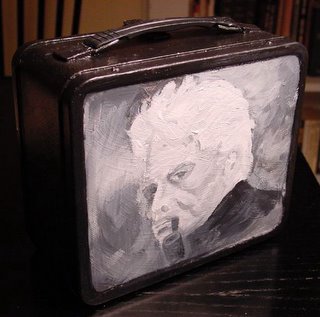
Sean de Toit (by the way the coolest name of any biblioblogers) asks the question of whether James thinks he is the only one to really understand Derrida, and wonders if the entire monstrosity surrounding Derrida can really be a chimera.
If I gave the impression that this is the scope of James' project, I must apologize; I can't imagine anyone saying that there is a 'single' correct interpretation of Derrida. What I feel James is attempting is a reading of Derrida that listens carefully to Derrida, and in the process seeks to dispel some of the 'pop-culture' interpretations of Derrida.
Next by way of via negative he explains deconstruction:
- Deconstruction is not a 'method'. It is not something we do to texts, deconstruction is already present in the texts, as interpreters we are but witnesses.
- Deconstruction is not merely negative 'destruction'. It is never a simple dismantling of texts, it is always a double movement of destructing with a view to reconstructing, thus the con infix is very important.
- Deconstruction is not a 'master' name. Deconstruction is not an adequate term, and must never be severed from the discourse of trace, margin, supplement, etc.
- Deconstruction is not nihilism. 'Deconstruction is not an enclosure in nothingness, but an openness towards the other (Deconstruction and the Other, 124).'
- Deconstruction is not anti-philosophical. While deconstruction questions the systems of philosophy and the institution of university, it is not opposed to either as such.
So as to come to a preliminary definition: 'Deconstruction then is a deeply affirmative mode of critique attentive to the way in which texts, structures and institutions marginalize and exclude 'the other', with a view to reconstructing and reconstituting institutions and practices to be more just (i.e. to respond to the call of the other).' (12)




5 comments:
The book seeks to understand Derrida through his philosophical heritage, which is why the book first caught my eye. My encounter with Derrida has been, up till now, through the eyes of literary critics.
Yea I am finding the Derrida’s take on Husserl’s idealities as most interesting. But James is no Derrida groupie.
Brian,
Have you looked at K. Vanhoozer's treatment of Derrida in "Is There a Meaning in this Text?" If so, what do you think of it? I'm just curious.
MO
It has been three years since I read Vanhoozer, so sorry I don't remember much.
Bryan, I just finished reading Penner's "Six Views" book on the subject of postmodernism in theology. It was wonderful! I have to say that I resonated most deeply with Vanhoozer's essays, though I really enjoyed Franke, Westphal and Jamie Smith's interaction as well. I'd be very curious to hear your appraisal of Vanhoozer in this volume if you get a chance to read it! Perhaps we could even set up a seperate blog to discuss it with a few contributors who've read the book!
Blue have not read it, I would love too, but don't have the book yet, although it is on my wish list.
Post a Comment